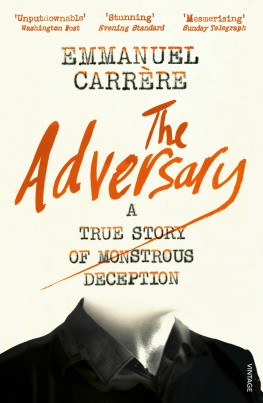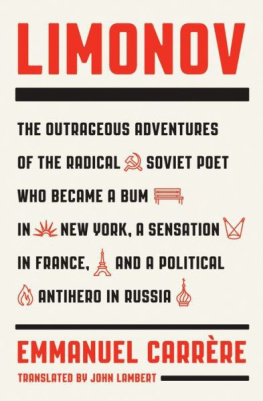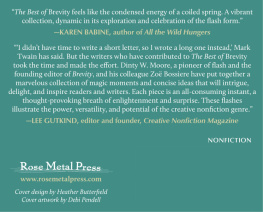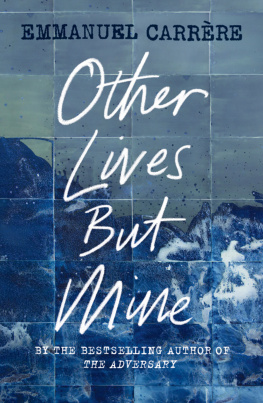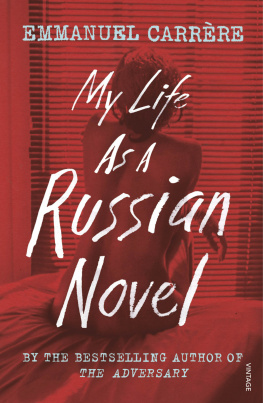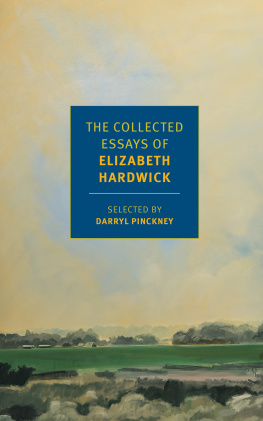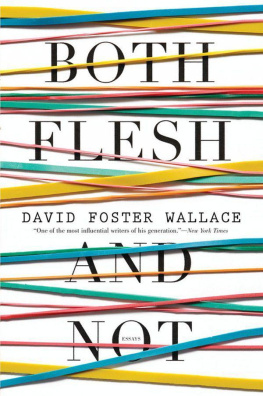The author and publisher have provided this e-book to you for your personal use only. You may not make this e-book publicly available in any way. Copyright infringement is against the law. If you believe the copy of this e-book you are reading infringes on the authors copyright, please notify the publisher at: us.macmillanusa.com/piracy.
1. Im Happy My Mothers Alive
Last 21 and 22 November, a twenty-one-year-old youth, Franck B., appeared before the Melun Criminal Court for having tried to kill Hlne R., his biological mother. Heres their story.
Twenty years earlier, Hlne R. was not yet a biological mother. She was just a single mother, panicked at what was happening to her. Shed given birth without daring to tell anyone and lost her job as a maid and the room that went with it. She dragged herself from shelter to shelter with her little boy, then with her little boy and her big belly, then with her two little boys because, repetition and hardship going hand in hand, Alexandre was born two years after Franck, to an equally anonymous father. Walled in by silence, fear, and constant rebuffs, Hlne didnt know where to turn for help, or what sort of help she really needed. The Department of Health and Social Services, whose door you knock on in such cases, didnt quite know either if it was better to help her keep her children or to take them away.
No doubt the boys would have suffered less if theyd been given up once and for all, rather than being shunted back and forth from negligent nanny to foster placement, but their mother couldnt resolve herself to sever all ties. She hesitated, then came back to get them right before the cutoff date, so that the separation, which was finally consummated in 1974, took five years. Today she says that she signed the fatal document without understanding what she was doing. She also says that even after signing it, she hoped to see her children again, that she applied to the Department of Health and Social Services for permission. But this time it was too late: theyd been adopted.
All that remained for Hlne to do was cry every night, clam up as shed always done, and console herselfwhile turning the knife in the woundwith the idea that somewhere in France her little boys lived with people who loved them and whom they loved.
About which she wasnt wrong. The B.s, who had adopted both Franck and Alexandrerebaptized Alain because, unlike his brother, he was young enough not to remember his namewere no doubt good people.
From day one, all parents discover with amazement a sense of fear that will never leave them. Inevitably, this fear is even stronger among adoptive parents. One imagines that the B.s felt a worried, conscientious love for the boys, considering themselves unworthy at the slightest warning sign. And the warning signs camefrom Franck, as one can imagine. He was a difficult, taciturn, rebellious child. The B.s did all they could to act as if he were really their son, and to be strict but kind. Despite this, or because of it, the typical textbook setbacks came about as the years passed, saddening Mr. B. enough for his wife to prefer not to grieve him any further by showing him what shed found in Francks room, and which would later, passing from one hand to the next, send a shiver down his jurors spines: a printed card with which Mr. B., Mrs. B., and Alain were deeply saddened to announce the death of their son and brother Franck, aged fifteen. The date was left blank.
Franck was fifteen at the time. Two years later, the idea of searching for his natural mother added a new layer to his morose daydreaming. A child who feels misunderstood by his biological parents can always imagine that theyre not really his, that his real parents are better looking, more loving, more everything. Such dreams are generally harmless. The problem in the case of an adopted child is that its not just a dream, and that somewhere in the real world, unknown but real people truly occupy this coveted place, and there is no greater or more heartrending temptation than to try to find them, see what they look like, and throw your love, or your hate, or both, in their faces.
Franck was expecting everything from this reunion: an explanation of his story, and the freedom to live it fully. It seems he had no problem finding his mother: he simply contacted the Department of Health and Social Services and they gave him her name, leaving it up to him to find her address. I say it seems, as this point was the only bone of contention in a trial where no one disputed the facts: Francks lawyer condemned the departments shameful irresponsibility, and the departments lawyer did his best to clear its name, without either convincing or even really interesting anyone.
In any event: One fine day in June 1988, the telephone rang at Hlne R.s place, in a housing project in the suburbs of Melun. Her son Frdric, aged eight, picked up the phone and told the anonymous caller that hed go get his mom.
One week later, Hlne R. opened the door to Franck.
He was a big, dark-haired youth, good-looking in a somber, reserved way, and was clearly trying to appear calm. The way he talked, you felt he would rather be silent: he was overly polite and almost pedantically neutral. His voice sounded almost artificial, and he looked a bit like the young zombielike actors in Robert Bressons films. Hlne R. didnt think any of that, just that this person in front of her was her lost child, that hed found her, and that was enough.
He called her Madame, then Hlne, but not Mom. He asked her questions. About his father, but that ground didnt take long to cover because she didnt even know his name: he was a railway worker, just passing through, thats all. About her life, her job: she worked as a housekeeper in a hospital. About the little boy, Frdric: shed been able to keep him, at least; her life had become a little less difficultshe was fighting to keep him, in fact, having separated from his father, who wanted custody and who wouldnt get it, she swore. Hearing that, Franck didnt raise an eyebrow. He preferred to ask her about a bump hed had on his forehead since he was littlehed often wondered how he got it. She told him that hed fallen down at his aunts place; shed babysat him when he was three.
Hlne gave the best answers she could and hardly asked a thing. For some people, having to put up with events becomes a habit and dulls the mind. You take things as they come and arent surprised: thats how things are. But as Franck was leaving, Hlne said that if he wanted to come back, the door would be open.
He came back that fall, for Frdrics birthday, bringing a watch as a present. Then he started coming quite often. His adoptive parents didnt know; he didnt talk to themor to Alainabout his absences. Hlne furnished a room for him in her little apartment, where he came to sleep from time to time. The contrast between the affluence of the B.s and his birth mothers world, so bereft of grace, intelligence, scopeof everythingseemed to leave him indifferent. Except as regarded Frdric, whom Franck would have liked to see get a better education. That his half brother was getting such a poor start in life worried Franck. He loved Frdric and still does: he approved of his mothers fighting to keep him.
As one can imagine, this reunion didnt bring Franck the clarification or liberation hed hoped for and only deepened his confusion. His double life, his secret comings and goings, quickly became unbearable. He tried to escape.
He fled to Sweden, under the pretense of doing grade twelve at the French high school in Stockholm. But he returned after just two months, and the back-and-forth started all over again. The B.s were saddened by his absences and his mood swings. Hlne continued to welcome him with her glum, placid kindness, and her exasperating way of finding such an unbearable situation perfectly normal.


